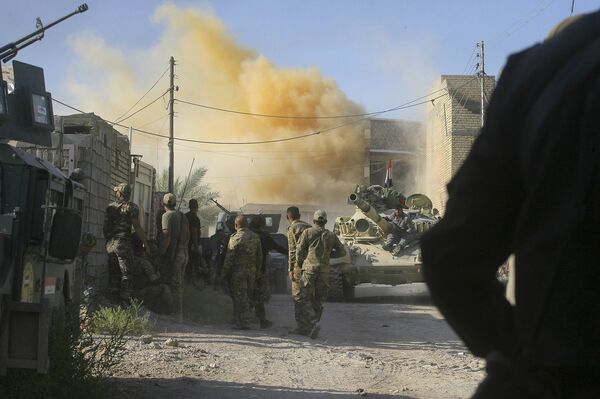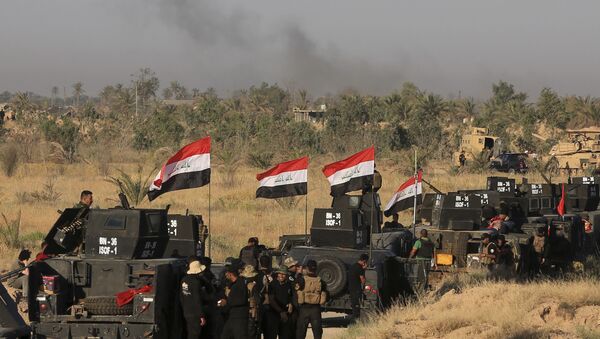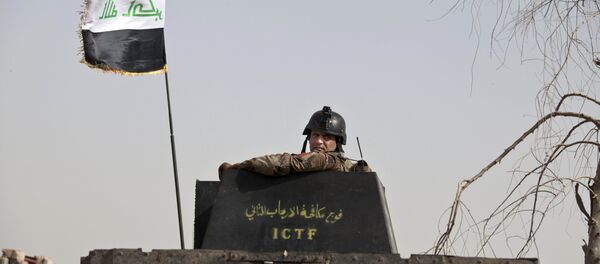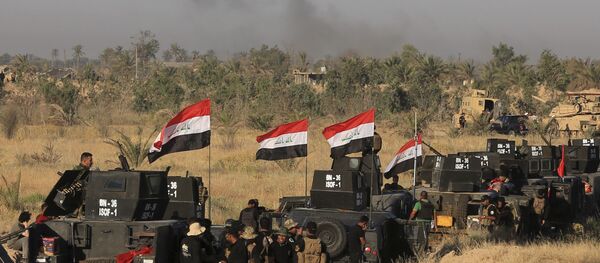At the entrance to the city of Fallujah, civilian vehicles are replaced by dusty armored military vehicles, some of which are lying turned upside down in the middle of the roads; others have bullet holes in them. There is also large number of ambulances transporting and catering to the wounded.
Fallujah was captured in early 2014 by Daesh. The militants have turned the town into a platform for further advances. Next, according to its leaders, under pressure from radical groups Baghdad was planned to be captured. Until that plan was to be materialized the terrorists prepared and carried out terrorist attacks, including suicide bombings in the capital.
City of Mosques
Fallujah is located in the Iraqi province of Al-Anbar, in the so-called Sunni Triangle which is a vast territory to the north and west of Baghdad, densely populated by Iraqi Sunnis.
The city has long been known for conservative and religious beliefs of its inhabitants and because of the abundance of minarets towering above it, the city is known as the “city of mosques” in the Muslim world.
After the overthrow of Saddam Hussein, Fallujah suffered tremendously at the hands of the US soldiers who stormed the city, twice in 2003 and 2004. It became a symbol of resistance to the invaders. The city started to become a hub for al-Qaeda militants who came “to protect Muslims from the infidels.”
Later on, infighting between Sunnis and Shiites started in the city resulting in thousands of Iraqi deaths. New impetus for interfaith confrontation was served by the Shiite government of Nouri al-Maliki, who stormed a Sunni protest camp in 2013 near the city of Ramadi.
At the same time in major cities of the Sunni provinces black flags of Daesh extremists, started to appear and only a few months later under the cheers of many residents the terrorists moved into the city, promising to “restore justice and punish the despots.”

According to militia intelligence, among those terrorists rooted in Fallujah and its surroundings there were more than three thousand insurgents, consisting of 65% of its own residents, 25% from other Iraqi cities and only 10% foreigners.
Apocalypse
“The victory in Fallujah has great propaganda effect for the victory over Daesh. They considered the city their bastion, their center of ‘Pure Islam,’ as well as a symbol of jihad because of fierce resistance to the Americans,” Brigadier General Yahya al-Zubaidi told RIA Novosti correspondent, Daminov, at the Iraqi security headquarters.
Terrorists have sought to ensure that local residents formed an apocalyptic image in their minds. At the squares and mosques surrounded by government forces, fanatics launched active propaganda, announcing the approach of the troops of Raafidis (Shiite names) who have “come to kill innocent Muslims.”

The population of the city, at the time of the assault was up to eighty thousand people, under death threats they were forbidden to leave the city. Those who tried to escape were shot dead as traitors.
According to al-Zubaidi, Daesh planned to use civilians as human shields, hoping that the death of indispensable people from the fighting would cause criticism from international organizations and would be able to stop the advance of the army.
Terrorists Make Poor Prisoners
The operation to free Fallujah was announced by the Iraqi authorities in the last week of May. A huge group of several tens of thousands of soldiers moved on the position of the radicals from all sides.
There were the government units, counter-terrorism units, and in the early stages Iranian-backed Shiite popular militia. There was also police and a number of Sunni tribes. There was also air support from the Iraqi air force, as well as fighter jets of the international coalition against Daesh.
At the headquarters for the Iraqi military military advisers from the United States and Iran provided assistance and coordinated airstrikes.
Therefore, in the first days of fighting there were almost no captured terrorists, because when they swore to surrender they would lie and detonate their suicide vests if the armed forces came any close.
“Among those Daesh members residing in Fallujah apart from Iraqis, there were Arabs (citizens of other Arab countries), as well as other foreigners, including citizens of Uzbekistan, Tajikistan, Kyrgyzstan. There were also Chechens. Currently we are making all of this sure,” Zubaidi told the correspondent.
Most foreigners were in the front ranks of the terrorists and were “put to disposal” by their religious leaders still on the outskirts of the city.
Men Without Beards
The fanatical radicalism and cruel punishment for abandonment that Daesh put on its militants did not help. The Iraqi army and counter-terrorism division methodically swept outposts block after block.

The militants failed to hold the city and they fled Fallujah. Many of the terrorists upon fleeing the city tried to mingle with the refugees. In abandoned homes and underground shelters, law enforcers found long, shaggy beards, recently shaved and Afghan national clothes.
According to the Iraqi army command during the operation almost two thousand terrorists were killed and one and half thousand were arrested.
Life After Daesh
Away from the city, in a refugee camp, the RIA Novosti correspondent spoke to some refugees of al-Fallujah who were recalling horrific memories of life under Daesh.
Daesh brought medieval radical order into the city and severely punished those who evaded them. Many refugees narrated how they were forcibly told to give their daughters to militants for marriage.
“They would say, your daughter is already an adult, thirteen years old. What do you do for a jihad to please Allah, let her marry a Mujahid by the way of God to you will be a reward in another life,” resident of Fallujah, Khaled told the correspondent.
Militants also confiscated the residents satellite dishes and put up an Internet ban, leaving the city living in an information vacuum often not knowing what was happening outside of Fallujah.
“We were not treated as human. They were trying to control everything. My brother because he had a beard not of the required length was sentenced to a hundred beatings with a stick and was thrown in jail,” another resident Umm Tariq said.
Despite the liberation of Fallujah, fighting in a number of its western suburbs is still ongoing. In the meantime, part of the government’s army and people's militia are preparing for another important and perhaps decisive battle to eradicate Daesh in the city of Mosul.




